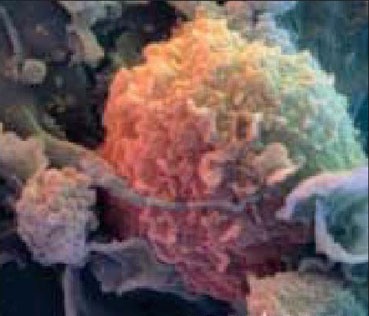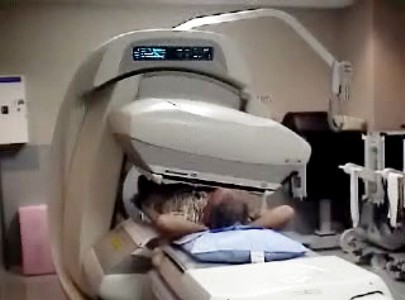29th December 2008 - New research
IMMUNE CELLS IMPLICATED IN PARKINSON'S
DISEASE
Journal of Clinical
Investigation [2008] Dec 22 (Brochard V, Combadi�re B, Prigent A, Laouar
Y, Perrin A, Beray-Berthat V, Bonduelle O, Alvarez-Fischer D, Callebert J,
Launay JM, Duyckaerts C, Flavell RA, Hirsch EC, Hunot S.) [Epub ahead of
print]
Complete abstract
French and American researchers have made
claims, supported by Parkinson's Disease organisations,
that a type of immune system cell may facilitate the development of
Parkinson's Disease, and that targeting part of the immune system with
drugs could be a new way to treat the disease. They showed that certain
types of immune cells (CD8+ and CD4+ T cells) but not B cells had invaded
the post-mortem brains of people with Parkinson's Disease, and also in
mice whose Parkinson's Disease had been created artificially using MPTP.
They showed that in mice, the artificially created Parkinson's Disease
symptoms were worse when there were insufficient immune cells.
 The
weakness in the claims being made is that even if these observations were
correct, they would not demonstrate that Parkinson's Disease was caused by
insufficiencies of the immune system. Conclusions have been made by the
researchers based solely on tenuous associations between the immune system
and Parkinson's Disease, and also based on observations only in mice that
did not actually have Parkinson's Disease. The other obvious weakness in
the claims being made are that dopaminergic drugs (such as L-dopa) can rid
Parkinson's Disease symptoms very readily, despite having no effect at all
on the immune system.
The
weakness in the claims being made is that even if these observations were
correct, they would not demonstrate that Parkinson's Disease was caused by
insufficiencies of the immune system. Conclusions have been made by the
researchers based solely on tenuous associations between the immune system
and Parkinson's Disease, and also based on observations only in mice that
did not actually have Parkinson's Disease. The other obvious weakness in
the claims being made are that dopaminergic drugs (such as L-dopa) can rid
Parkinson's Disease symptoms very readily, despite having no effect at all
on the immune system.
26th December 2008 - New research
INFANTILE PARKINSONISM
Journal Inherited Metabolic Diseases [2008] Dec 26; [Epub ahead of print]
(Pons R.)
Complete abstract
Parkinson's Disease is
stereotypically assumed to be a medical disorder of old age. The average
onset in some countries is the late 50's. So the average age of people
with Parkinson's Disease in many
countries is in the 60's or older. However, Parkinson's Disease can occur
at any age. There are many people with Parkinson's Disease in their 40's,
30's and 20's. There are teenagers and even children with Parkinson's
Disease. The first case of juvenile Parkinson's Disease was discovered over
a century ago concerned a child who had all the symptoms of
Parkinson's Disease who was only 3 years old.
Paediatric
neurotransmitter diseases are a group of inherited genetic disorders attributable
to a disturbance of neurotransmitter metabolism. Neurotransmitters are
substances that initiate the various functions in the brain.
 Given their
various functions, their disorders have a wide variety of
manifestations, with physical movement dysfunction being the most
prominent clinical feature. The severity of symptoms ranges from mild to
severe. The genetic disorder of this kind most closely related to Parkinson's
Disease is Tyrosine Hydroxylase Deficiency. For more information go to a
Complete Review.
Children with this medical disorder are severely disabled from infancy.
They have a complete inability to produce L-dopa, a substance whose
deficiency is the primary cause of Parkinson's Disease. This is
because
Tyrosine Hydroxylase is a chemical that is naturally produced in the brain
that is essential for the formation of L-dopa.
Given their
various functions, their disorders have a wide variety of
manifestations, with physical movement dysfunction being the most
prominent clinical feature. The severity of symptoms ranges from mild to
severe. The genetic disorder of this kind most closely related to Parkinson's
Disease is Tyrosine Hydroxylase Deficiency. For more information go to a
Complete Review.
Children with this medical disorder are severely disabled from infancy.
They have a complete inability to produce L-dopa, a substance whose
deficiency is the primary cause of Parkinson's Disease. This is
because
Tyrosine Hydroxylase is a chemical that is naturally produced in the brain
that is essential for the formation of L-dopa.
Genetic disorders, such as this, are usually
examples of a medical disorder at its worst, because the entire
biochemical function is completely dysfunctional. In this form of
Infantile Parkinsonism there is a complete lack of Tyrosine Hydroxylase.
However, in normal Parkinson's Disease,
Tyrosine Hydroxylase is present, but the substances it needs to produce
L-dopa are deficient. For more information go to the
Biochemistry of Parkinson's Disease.
21st December 2008 - New research
PSYCHOSIS IN PARKINSON'S DISEASE
Drugs and Aging
[2008] 25 (8) : 665-682 (Zahodne LB, Fernandez HH.)
Complete abstract
Parkinson's Disease is primarily due to insufficient dopamine. In
contrast, psychosis is believed to be due to an accumulation of dopamine.
So biochemically, Parkinson's Disease and psychosis are almost opposites.
Because of this, anti-psychotics can cause symptoms of Parkinson's
Disease, and an excess of Parkinson's Disease drugs can cause symptoms of
psychosis. Psychotic symptoms in Parkinson's disease are relatively common
in later and more severe Parkinson's Disease. Besides creating a
disturbance in patients' daily lives, there is a prominence of visual
hallucinations and progression over time. The most common cause of
psychosis in Parkinson's Disease has been the use (especially excessive
use) of Parkinson's
Disease drugs - particularly dopamine agonists.
 Other risk factors discussed
in the medical literature include older age, disease severity, sleep
disturbance, cognitive impairment, dementia and depression. Preliminary
reports have also shown a potential relationship between deep brain
stimulation surgery and Parkinson's Disease psychosis. When a reduction in
Parkinson's Disease drugs to the lowest tolerated level does not improve
psychosis, further intervention may be warranted. Several atypical
antipsychotic agents (iclozapine, olanzapine) have been shown to be
efficacious in reducing psychotic symptoms in Parkinson's Disease.
However, they have only achieved this with adverse effects. Results from a
clinical trial involving a large number of hallucinating Parkinson's
Disease patients support the efficacy of rivastigmine.
Other risk factors discussed
in the medical literature include older age, disease severity, sleep
disturbance, cognitive impairment, dementia and depression. Preliminary
reports have also shown a potential relationship between deep brain
stimulation surgery and Parkinson's Disease psychosis. When a reduction in
Parkinson's Disease drugs to the lowest tolerated level does not improve
psychosis, further intervention may be warranted. Several atypical
antipsychotic agents (iclozapine, olanzapine) have been shown to be
efficacious in reducing psychotic symptoms in Parkinson's Disease.
However, they have only achieved this with adverse effects. Results from a
clinical trial involving a large number of hallucinating Parkinson's
Disease patients support the efficacy of rivastigmine.
16th December 2008 - New review
AGENT ORANGE
Agent Orange is the
name given to a herbicide used by the U.S. Military during the Vietnam War
as a means of warfare. It got its name from the colour of the barrels it
was stored in. It was mainly used to clear the dense jungle within which the
opposing forces fought, and also often to destroy the enemy's crops. For
more information go to
Agent
Orange.
 It has been widely claimed that Agent Orange has caused a wide
variety of medical disorders,
including Parkinson's Disease.
For more information go to
Agent Orange and Parkinson's Disease. Vietnam veterans have detailed
how they were exposed to Agent Orange during the Vietnam War, and that
they subsequently developed Parkinson's Disease.
Some herbicides have been shown to cause
Parkinson's Disease.
For more information
go to the
Toxic causes of Parkinson's Disease. So there would appear to be the
potential for Agent Orange to cause Parkinson's Disease.
It has been widely claimed that Agent Orange has caused a wide
variety of medical disorders,
including Parkinson's Disease.
For more information go to
Agent Orange and Parkinson's Disease. Vietnam veterans have detailed
how they were exposed to Agent Orange during the Vietnam War, and that
they subsequently developed Parkinson's Disease.
Some herbicides have been shown to cause
Parkinson's Disease.
For more information
go to the
Toxic causes of Parkinson's Disease. So there would appear to be the
potential for Agent Orange to cause Parkinson's Disease.
There have been
over 300 published studies on the effects of Agent Orange, many of which
detail its medical effects such as cancer, diabetes or severe birth
defects. However, their biochemistry is very different from that of
Parkinson's Disease. Out of the more than 300 studies concerning Agent
Orange, none of them have ever shown
that Agent
Orange has caused Parkinson's
Disease.
 Claims of Agent Orange causing Parkinson's Disease have usually detailed how Parkinson's Disease
was diagnosed many years after possible exposure to Agent Orange. However,
with Parkinson's Disease,
if somebody is affected by a toxin, they
usually suffer the toxic effects at their worst soon after exposure to the
toxin. Toxic effects usually then decline very gradually after the person
is no longer exposed. So if Agent Orange caused the symptoms of
Parkinson's Disease, they would have initiated whilst in Vietnam - not
decades later. Somebody could be exposed to Agent Orange and quite
independently develop
Parkinson's Disease. Parkinson's Disease can occur in
almost anyone without toxicity being the cause. For more information go to the
Causes of Parkinson's Disease.
Claims of Agent Orange causing Parkinson's Disease have usually detailed how Parkinson's Disease
was diagnosed many years after possible exposure to Agent Orange. However,
with Parkinson's Disease,
if somebody is affected by a toxin, they
usually suffer the toxic effects at their worst soon after exposure to the
toxin. Toxic effects usually then decline very gradually after the person
is no longer exposed. So if Agent Orange caused the symptoms of
Parkinson's Disease, they would have initiated whilst in Vietnam - not
decades later. Somebody could be exposed to Agent Orange and quite
independently develop
Parkinson's Disease. Parkinson's Disease can occur in
almost anyone without toxicity being the cause. For more information go to the
Causes of Parkinson's Disease.
12th December 2008 - News release
VACCINE FOR PARKINSON'S DISEASE
AFFiRiS has started pre-clinical development
of a vaccine for Parkinson�s Disease. The vaccine, known as PD01, targets
alpha-synuclein - a substance whose accumulation is claimed to cause
Parkinson's Disease because of cell
 damage.
The same technology has already been used to develop vaccines for
Alzheimer's Disease. The aim of the study is to prove efficacy and safety.
The Chief Scientific Officer at AFFiRiS, said : "The great potential
offered by our AFFITOME technology has been confirmed by external experts,
who appraised our development of a Parkinson's vaccine for the Austrian
Research Promotion Agency (FFG). Their assessment prompted the FFG to
provide considerable financial support for this project." For more
information go to the
Complete article.
damage.
The same technology has already been used to develop vaccines for
Alzheimer's Disease. The aim of the study is to prove efficacy and safety.
The Chief Scientific Officer at AFFiRiS, said : "The great potential
offered by our AFFITOME technology has been confirmed by external experts,
who appraised our development of a Parkinson's vaccine for the Austrian
Research Promotion Agency (FFG). Their assessment prompted the FFG to
provide considerable financial support for this project." For more
information go to the
Complete article.
The weaknesses in the theory on which the
method is reliant is that a lot of people with Parkinson's Disease do not
accumulate alpha-synuclein. So there is none to get rid of. Alph-synuclein
doesn't cause Parkinson's Disease either. Most people that have an
accumulation of alpha-synuclein in the brain do not have Parkinson's
Disease. Also, L-dopa can readily rid symptoms in most people without
affecting alpha-synuclein, thereby proving that the ridding of
alpha-synuclein in the brain is not needed in order to rid Parkinson's
Disease.
6th December 2008 - New research
THE LIKELIHOOD OF TOXICITY CAUSING
PARKINSON'S DISEASE
Journal of Agromedicine [2008] 13 (1) : 37-48
(Dhillon AS, Tarbutton GL, Levin JL, Plotkin GM, Lowry LK, Nalbone JT,
Shepherd S.)
Complete
abstract
There are a number
of toxic substances that are known to cause Parkinson's Disease. For more
information go to
Toxic causes of Parkinson's Disease. Toxicity can cause Parkinson's
Disease on its own, or can make Parkinson's Disease more likely if
combined with other factors. Toxicity can initiate Parkinson's Disease,
and then lead to persistent Parkinson's Disease because of the after
effect of drugs needed to treat it, even when the toxic effect has worn
off. Toxicity can often be reversed by avoiding the toxic substance.
However, with some toxins this can take years because the toxin can
accumulate in the blood and in the brain. Toxicity is often claimed to be
the main cause
of
Parkinson's Disease, but evidence indicates that toxicity causes
Parkinson's Disease only in a minority of cases.
 It has not previously
been known how readily various toxins can cause Parkinson's Disease. This
study evaluated the risk of causing Parkinson's Disease after exposure to
a variety of toxins. Rotenone, a pesticide, was found to massively
increase the risk of Parkinson's Disease, even when used when only during
the past year doing gardening. Any use at all of rotenone in the past made
Parkinson's Disease far more likely. Of those substances assessed, the
next most likely to cause Parkinson's Disease were, in order : work in a
paper / lumber mill, exposure to cadmium, past work in an electronics
plant, insecticide
applications to animal areas and agricultural processes, paraquat (the
herbicide), exposure to fluorides (used in industry), and least of all,
the use of chlorpyrifos products (insecticides).
Cigarette smoking, alcohol use, and fish
intake were associated with a reduced risk.
It has not previously
been known how readily various toxins can cause Parkinson's Disease. This
study evaluated the risk of causing Parkinson's Disease after exposure to
a variety of toxins. Rotenone, a pesticide, was found to massively
increase the risk of Parkinson's Disease, even when used when only during
the past year doing gardening. Any use at all of rotenone in the past made
Parkinson's Disease far more likely. Of those substances assessed, the
next most likely to cause Parkinson's Disease were, in order : work in a
paper / lumber mill, exposure to cadmium, past work in an electronics
plant, insecticide
applications to animal areas and agricultural processes, paraquat (the
herbicide), exposure to fluorides (used in industry), and least of all,
the use of chlorpyrifos products (insecticides).
Cigarette smoking, alcohol use, and fish
intake were associated with a reduced risk.
1st December 2008 - New research
SCANNING METHODS GIVE CERTAINTY IN
DIAGNOSING
PARKINSON'S DISEASE
European Journal of Nuclear Medicine and
Molecular Imaging [2008] Nov 27; [Epub ahead of print] (Eshuis SA, Jager
PL, Maguire RP, Jonkman S, Dierckx RA, Leenders KL.)
Complete abstract
Around 25% of people diagnosed with Parkinson's Disease are wrongly
diagnosed. Very false ideas as to what the symptoms of Parkinson's Disease
are, and the symptoms of many other medical disorders coinciding with
Parkinson's Disease has made the accurate diagnosis of Parkinson's Disease
a major problem. This is especially true in the early stages of
Parkinson's Disease, because the original diagnosis of many people is
based on very mild symptoms. There are two major scanning methods that are
used to diagnose Parkinson's Disease : the
SPECT scan
and the
PET scan.
Using these methods, the brain is scanned in order to assess the
level of dopamine being
formed. For more information go to the
Diagnosis of Parkinson's Disease.
 This study assessed these two
methods to see how reliable they were, and which of them was better.
People were assessed who either had : mild Parkinson's Disease, severe
Parkinson's Disease, or who didn't have Parkinson's Disease at all. Both
scanning methods were able to accurately discriminate people who had
Parkinson's Disease from those that didn't. When assessed in the most
appropriate parts of the brain, the accuracy was found to be 100% for both
methods. The results suggest that scanning should be a routine part of
diagnosis. However, the high costs of carrying out scans for some people
can make this method of diagnosis prohibitive.
This study assessed these two
methods to see how reliable they were, and which of them was better.
People were assessed who either had : mild Parkinson's Disease, severe
Parkinson's Disease, or who didn't have Parkinson's Disease at all. Both
scanning methods were able to accurately discriminate people who had
Parkinson's Disease from those that didn't. When assessed in the most
appropriate parts of the brain, the accuracy was found to be 100% for both
methods. The results suggest that scanning should be a routine part of
diagnosis. However, the high costs of carrying out scans for some people
can make this method of diagnosis prohibitive.
.gif)
.gif)
 The
weakness in the claims being made is that even if these observations were
correct, they would not demonstrate that Parkinson's Disease was caused by
insufficiencies of the immune system. Conclusions have been made by the
researchers based solely on tenuous associations between the immune system
and Parkinson's Disease, and also based on observations only in mice that
did not actually have Parkinson's Disease. The other obvious weakness in
the claims being made are that dopaminergic drugs (such as L-dopa) can rid
Parkinson's Disease symptoms very readily, despite having no effect at all
on the immune system.
The
weakness in the claims being made is that even if these observations were
correct, they would not demonstrate that Parkinson's Disease was caused by
insufficiencies of the immune system. Conclusions have been made by the
researchers based solely on tenuous associations between the immune system
and Parkinson's Disease, and also based on observations only in mice that
did not actually have Parkinson's Disease. The other obvious weakness in
the claims being made are that dopaminergic drugs (such as L-dopa) can rid
Parkinson's Disease symptoms very readily, despite having no effect at all
on the immune system. Given their
various functions, their disorders have a wide variety of
manifestations, with physical movement dysfunction being the most
prominent clinical feature. The severity of symptoms ranges from mild to
severe. The genetic disorder of this kind most closely related to Parkinson's
Disease is Tyrosine Hydroxylase Deficiency. For more information go to a
Given their
various functions, their disorders have a wide variety of
manifestations, with physical movement dysfunction being the most
prominent clinical feature. The severity of symptoms ranges from mild to
severe. The genetic disorder of this kind most closely related to Parkinson's
Disease is Tyrosine Hydroxylase Deficiency. For more information go to a
 Other risk factors discussed
in the medical literature include older age, disease severity, sleep
disturbance, cognitive impairment, dementia and depression. Preliminary
reports have also shown a potential relationship between deep brain
stimulation surgery and Parkinson's Disease psychosis. When a reduction in
Parkinson's Disease drugs to the lowest tolerated level does not improve
psychosis, further intervention may be warranted. Several atypical
antipsychotic agents (iclozapine, olanzapine) have been shown to be
efficacious in reducing psychotic symptoms in Parkinson's Disease.
However, they have only achieved this with adverse effects. Results from a
clinical trial involving a large number of hallucinating Parkinson's
Disease patients support the efficacy of rivastigmine.
Other risk factors discussed
in the medical literature include older age, disease severity, sleep
disturbance, cognitive impairment, dementia and depression. Preliminary
reports have also shown a potential relationship between deep brain
stimulation surgery and Parkinson's Disease psychosis. When a reduction in
Parkinson's Disease drugs to the lowest tolerated level does not improve
psychosis, further intervention may be warranted. Several atypical
antipsychotic agents (iclozapine, olanzapine) have been shown to be
efficacious in reducing psychotic symptoms in Parkinson's Disease.
However, they have only achieved this with adverse effects. Results from a
clinical trial involving a large number of hallucinating Parkinson's
Disease patients support the efficacy of rivastigmine.  It has been widely claimed that Agent Orange has caused a wide
variety of medical disorders,
including Parkinson's Disease.
For more information go to
It has been widely claimed that Agent Orange has caused a wide
variety of medical disorders,
including Parkinson's Disease.
For more information go to
 Claims of Agent Orange causing Parkinson's Disease have usually detailed how Parkinson's Disease
was diagnosed many years after possible exposure to Agent Orange. However,
with Parkinson's Disease,
if somebody is affected by a toxin, they
usually suffer the toxic effects at their worst soon after exposure to the
toxin. Toxic effects usually then decline very gradually after the person
is no longer exposed. So if Agent Orange caused the symptoms of
Parkinson's Disease, they would have initiated whilst in Vietnam - not
decades later. Somebody could be exposed to Agent Orange and quite
independently develop
Parkinson's Disease. Parkinson's Disease can occur in
almost anyone without toxicity being the cause. For more information go to the
Claims of Agent Orange causing Parkinson's Disease have usually detailed how Parkinson's Disease
was diagnosed many years after possible exposure to Agent Orange. However,
with Parkinson's Disease,
if somebody is affected by a toxin, they
usually suffer the toxic effects at their worst soon after exposure to the
toxin. Toxic effects usually then decline very gradually after the person
is no longer exposed. So if Agent Orange caused the symptoms of
Parkinson's Disease, they would have initiated whilst in Vietnam - not
decades later. Somebody could be exposed to Agent Orange and quite
independently develop
Parkinson's Disease. Parkinson's Disease can occur in
almost anyone without toxicity being the cause. For more information go to the
 damage.
The same technology has already been used to develop vaccines for
Alzheimer's Disease. The aim of the study is to prove efficacy and safety.
The Chief Scientific Officer at AFFiRiS, said : "The great potential
offered by our AFFITOME technology has been confirmed by external experts,
who appraised our development of a Parkinson's vaccine for the Austrian
Research Promotion Agency (FFG). Their assessment prompted the FFG to
provide considerable financial support for this project." For more
information go to the
damage.
The same technology has already been used to develop vaccines for
Alzheimer's Disease. The aim of the study is to prove efficacy and safety.
The Chief Scientific Officer at AFFiRiS, said : "The great potential
offered by our AFFITOME technology has been confirmed by external experts,
who appraised our development of a Parkinson's vaccine for the Austrian
Research Promotion Agency (FFG). Their assessment prompted the FFG to
provide considerable financial support for this project." For more
information go to the
 It has not previously
been known how readily various toxins can cause Parkinson's Disease. This
study evaluated the risk of causing Parkinson's Disease after exposure to
a variety of toxins. Rotenone, a pesticide, was found to massively
increase the risk of Parkinson's Disease, even when used when only during
the past year doing gardening. Any use at all of rotenone in the past made
Parkinson's Disease far more likely. Of those substances assessed, the
next most likely to cause Parkinson's Disease were, in order : work in a
paper / lumber mill, exposure to cadmium, past work in an electronics
plant, insecticide
applications to animal areas and agricultural processes, paraquat (the
herbicide), exposure to fluorides (used in industry), and least of all,
the use of chlorpyrifos products (insecticides).
Cigarette smoking, alcohol use, and fish
intake were associated with a reduced risk.
It has not previously
been known how readily various toxins can cause Parkinson's Disease. This
study evaluated the risk of causing Parkinson's Disease after exposure to
a variety of toxins. Rotenone, a pesticide, was found to massively
increase the risk of Parkinson's Disease, even when used when only during
the past year doing gardening. Any use at all of rotenone in the past made
Parkinson's Disease far more likely. Of those substances assessed, the
next most likely to cause Parkinson's Disease were, in order : work in a
paper / lumber mill, exposure to cadmium, past work in an electronics
plant, insecticide
applications to animal areas and agricultural processes, paraquat (the
herbicide), exposure to fluorides (used in industry), and least of all,
the use of chlorpyrifos products (insecticides).
Cigarette smoking, alcohol use, and fish
intake were associated with a reduced risk.  This study assessed these two
methods to see how reliable they were, and which of them was better.
People were assessed who either had : mild Parkinson's Disease, severe
Parkinson's Disease, or who didn't have Parkinson's Disease at all. Both
scanning methods were able to accurately discriminate people who had
Parkinson's Disease from those that didn't. When assessed in the most
appropriate parts of the brain, the accuracy was found to be 100% for both
methods. The results suggest that scanning should be a routine part of
diagnosis. However, the high costs of carrying out scans for some people
can make this method of diagnosis prohibitive.
This study assessed these two
methods to see how reliable they were, and which of them was better.
People were assessed who either had : mild Parkinson's Disease, severe
Parkinson's Disease, or who didn't have Parkinson's Disease at all. Both
scanning methods were able to accurately discriminate people who had
Parkinson's Disease from those that didn't. When assessed in the most
appropriate parts of the brain, the accuracy was found to be 100% for both
methods. The results suggest that scanning should be a routine part of
diagnosis. However, the high costs of carrying out scans for some people
can make this method of diagnosis prohibitive.